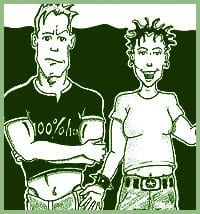In the audience for the Reel Trans series at Inside Out film fest, there were three or four bio boys, a wide smattering of trans folk and a horde of queer women. Inside Out audiences are usually comprised almost entirely men or entirely of women depending on the screening. What were all these women doing at a screening of shorts about trannies?
Certainly it wasn’t that all transsexual and transgendered people now identify as lesbians, nor were all the shorts about people who identify as lesbians. But somehow the lesbian community has grown a connection to the TS/TG one that gay men could learn a lot from. Simply, lesbians are more welcoming of TS/TG people than gay men.
Which is not to say lesbians have done all their work. As I’ve transitioned from female to male, I’ve lost a number of women’s spaces. I’ve been kicked out of a women’s hostel in the middle of the night and lost a much loved job of three years for coming out as trans. But if an event is advertised as “trans inclusive,” dollars to donuts it’s a women’s event.
The request for volunteers for June’s Pussy Palace said that priority would be given to people from marginalized groups, and specifically mentioned people of colour and trans-identified individuals. It’s still called a women’s bathhouse, but organizers have gone out of their way to welcome all trans people. Spaces such as the Women’s Centre at York University have changed their mandate and constitution to offer services to “women and trans folk.” When events and spaces so clearly include all manner of TS/TG identified folk, it means trans men can attend without threatening their gender identity. It also allows other participants to flex their gender. Many queer women recognized this as a good thing.
Why? It could be partly historical. In most cities there were gay bars before there were lesbian bars, and many lesbians remember how uncomfortable they felt going to gay bars – and simultaneously felt they were much better than straight bars. Lesbians are more familiar with the experience of having nowhere to go.
They’re also a lot closer to the experience of having no money to spend. With no OHIP coverage for surgery, transition is not cheap, and being trans-identified can have an adverse effect on finding and maintaining employment. While poverty is not limited to women, women still make less money than men. Cheap events and sliding scale events seem to be more common at women’s events than at men’s.
Perhaps because of that difference in disposable income, lesbians are less likely to be the queer folk we see in glossy print ads or on TV. The image of the ideal lesbian is less culturally fixed than the image of the ideal gay man. For example, lesbians are often far less critical of embracing butches than gay men are of embracing sissies.
Many lesbians appreciate “butch” identity as sexy. While I’m not saying butches and trannies are synonymous, we all mess with people’s expectations of gender.
For female-to-male (FTM) transsexuals, attendance at gay male events seems to require passing as male, while, increasingly, women seem willing to include male-to-female (MTF) transsexuals that don’t pass – and FTMs that do.
The same negotiations play out on a personal level. I’m really tired of this scenario: Tranny boy meets hot fag, they go home together, have hot sex and in the morning the bio-fag has a crisis to the tune of, “Oh my God, I slept with a woman!”
I’m equally tired of this one: Tranny boy meets hot dyke, they go home together, fuck like weasels and in the morning bio-dyke has a crisis to the tune of, “Oh my God, I slept with a man!”
Both make for bad breakfast conversation. Both include levels of acceptance and rejection of my identity as male. Neither make for much more than one night stands. People who can enjoy a night of hot sex without it upsetting their sexual identity are rare treats. People who are further willing to negotiate what their sex and mine mean in a relationship are even rarer.
While there is the occasional lesbian or gay man willing to make those leaps, more often it is those who identify as queer who are willing to bend. It makes me value queer as an identity, and also value those who are willing to be fluid in their play.
I grew up in the lesbian community. Back when I knew I wasn’t straight, but had no idea how queer I was, the lesbian community was home. Attending women’s and lesbian events now is honouring my past. It may be to connect with or hang out with old friends, to support the particular group or cause, to pick-up – or just because I want to be there. It doesn’t mean I’m a lesbian, but I do know what it feels like to be one.
Attending gay men’s events is honouring my present and future and my reasons for wanting to be there are similar mix of politics, pleasure and desire. Not all of us came out as gay men at birth, and seeing a man in a gay bar is no guarantee as to what sex his last lover was or whose bed he will go home to tonight.
On that level I’m no different. There’s a lot of sexual fluidity out there baby, and we all know that a little fluid can make sex a good thing.

 Why you can trust Xtra
Why you can trust Xtra


